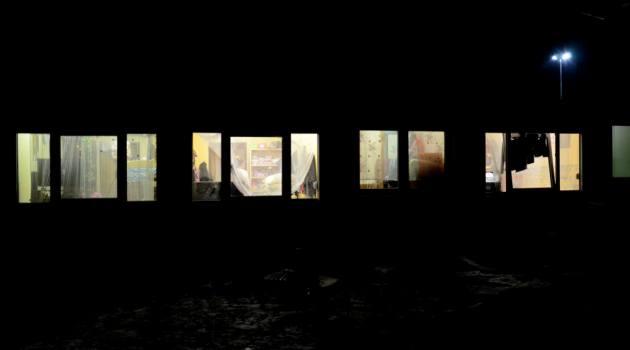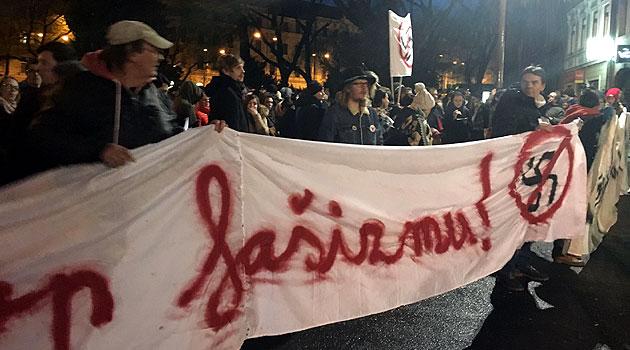Commentary on eviction in Slovakia: A rational society does not make a profit from or save money on the poor

Roughly one month ago, in the city of Žilina, Slovakia, an apartment building on Bratislavská Street was evacuated with the assistance of police and subsequently demolished. Its approximately 120 occupants, including 58 children, were moved into a nearby gym for a couple of days.
They were then given two options. The first was to live on the street without any substitute accommodation.
The second was to move into so-called temporary shelter arranged for them by the city. That option consists of 10 container units, each 17 meters square, equipped with heaters, and access to two more containers offering shared toilets and washing facilities.
The cost to rent one cell was set at EUR 40 per month. Deposits for utilities come to another EUR 160 per month.
Altogether, therefore, it costs EUR 200 per month to live in a 17-meter square unit. So much for the pleasant facts of which the city is so proud.
I will permit myself to add some more facts here. The apartment building at issue had experienced a fire, but the static damage sustained was of a minor nature and clearly could have been repaired.
If the land on which the construction was standing had not been so attractive, the city would certainly have found the money to repair it in a more effective way than by choosing a costly clearance involving demolition. If the occupants of the building had not been so-called problematic tenants owing back rent and utilities to the city, then the city assembly would certainly have found more dignified substitute accommodation for the occupants affected and would not have thrown them into these economic conditions, which for them are a priori untenable.
These large families will have difficulty making the monthly payments given their low incomes because they do not have the option of using reserves to buy food and care for their children. Our NGO is providing immediate financial aid and the care of a psychologist, etc., for these so-called “fellow citizens of a different type” who have lost their homes through this unfortunate event.
The attempt by the city to solve the problem of its impoverished, problematic residents by creating conditions such that they prefer to move elsewhere is absolutely apparent. What did I actually find when I visited their new location?
Omnipresent trauma caused to the occupants, fear, desperation, powerlessness, children sleeping on the bare floor, and a hygienic collapse. The 10 container units were placed side by side in the mud, while the other two with only partially-functioning bathrooms are nearby (in the ladies’ section two water heaters didn’t work, while in the men’s section two sinks did not work).
For 120 occupants there are two WCs for men and two for women, three sinks in one bathroom and one in the other, and two functioning showers, one in each bathroom. Between the bathrooms and the residential cells there is a muddy path, a distance to travel of between 10-30 meters, depending on where one lives.
So much for the temporary constructions themselves. Now let’s discuss the living conditions, i.e., the people.
In each unit there live between nine and 19 people. The reported number of 120 evictees comes from the so-called officially registered occupants, i.e., those who had their “permanent” residency in the now-demolished apartment building, but the actual number of people who were evicted is around 150.
If you picture such a number of people in that amount of space, you will comprehend that there is an average of 1.13 meters per occupant in which to sleep, spend the day, and store personal items. Does that seem technically impossible to you?
I saw with my own eyes that these people are being de facto forced to live in such conditions and to pay a lot of money for the privilege. One of the containers even houses four different evicted families, which means unrelated people are living together, most of them elderly, and one invalid.
At night these people lie on the floor in rows, filling the space right up to the door. They have their elderly parents and very young children among them.
The notion of privacy in these conditions is like science fiction, and to make their way to the toilet at night means they have to walk across everybody else’s prone bodies. Some of the men spend the night outside on little chairs and catch up on their sleep during the day because there actually is not enough room for everybody occupying the space to lie down.
One man during our visit left to go into town after deciding he would assault a police officer so he could arrange to spend the night in jail, where he said he would be better off. Let’s reflect on that statement.
Prison norms establish that each convict musst receive four square meters of space, heat, three meals a day, clean clothing, a bed with clean sheets, and unrestricted access to a toilet and to water. We care for such citizens without protest, using the money that we all provide through our taxes, we have no problem at all with it compared to our attitudes toward providing similar care for the impoverished.
Just as carefully, we also monitor whether the rights of imprisoned persons are upheld. We know how to take care of convicts, of persons living with disabilities, of senior citizens, of foreign nationals seeking asylum – but we turn our backs on the poor?
We perceive the impoverishment and the intractable situation of these most abject people as something that does not affect us? IF WE IGNORE POVERTY, WE ARE CONSCIOUSLY COMMITTING THE DEVASTATION OF SOCIETY AS A WHOLE.
The beginning of this article gives the generally attractive impression that “the city is taking care of the situation.” The rest of the piece clearly points out “how” the city is doing that.
I will leave it up to you to judge. I personally came away from my visit there with enormous shame and sorrow over being part of a society that approaches its own problems this way.
As I was driving away, several women called out to me: “We beg you, tell somebody about us!” I told them that I would.
I wish you all a good Advent and a rich Christmas table. Thanks to Honza Johny Čonka for his assistance and the brilliant job he did accompanying me.
